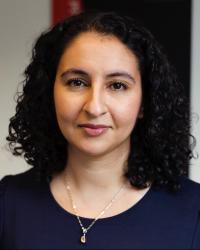
Contact Information
Biography
I am a historian of the modern Middle East. I am also an adjunct faculty member in the Department of Middle Eastern Languages and Cultures and an affiliate of the Jackson School's Middle East Center. My first book, City of Black Gold: Oil, Ethnicity, and the Making of Modern Kirkuk (Stanford University Press, 2019), explores how oil and urbanization made ethnicity into a political practice in Kirkuk, a multilingual city that was the original hub of Iraq's oil industry. My work has also appeared in Comparative Studies of South Asia, Africa and the Middle East; Journal of Urban History; Arab Studies Journal; Journal of Contemporary Iraq & the Arab World; Jadaliyya; and Middle East Report. My research has been funded by, among others, the Institute of Historical Research, University of London; the Academic Research Institute in Iraq; and UW's Simpson Center for the Humanities.
In my classes, we collectively engage in reflection, dialogue, and analysis of how and why we research, write, teach, and do history, and how histories of the Middle East help us think through other problems across time and space. My teaching has been recognized with several awards, including UW's Distinguished Teaching Award. My students should be reassured that I do not—and will not, despite Canvas's partnership with OpenAI and UW's billionaire-funded initiative to incorporate "AI" into teaching—use machine-generated materials in the place of thoughtful evaluation, human-produced knowledge, critical writing, real sources, or actual dialogue.
In my research, I reframe histories of the nation-state—particularly in Iraq and the Gulf region—by examining cities, borderlands, and resources. I seek to understand how people practice politics via emerging forms of identification and how those concepts develop in relation to empire, colonialism, state-making, and transformations in infrastructure and the built environment. I critically explore concepts like ethnicity and nation, as well as the phenomena of crisis, intercommunal violence, and mass atrocity. In City of Black Gold, I show how Kirkuk became segregated and polarized through British colonialism, urban development schemes, the expansion of the oil industry, and Baghdad's systematic attempts to integrate Kirkuk into an Arabized Iraq. I am currently working on a project on colonialism and anticolonialism across Iraq and Kuwait that asks how colonized people articulate their political aspirations in places where imperial relationships and sovereignties are in contradiction. In particular, I ask: what do these processes look like in a region central to the fossil-fuel industry that is severely affected by climate change, and one where migration is (or was) routine?
My experiences as an Assyrian inform my scholarship and teaching. I have supported work in Assyrian/Syriac history at UW through my graduate advising and public-facing events.
Find more information on my publications via Google Scholar and ORCID.
Awards
Research
Selected Research
- Bet-Shlimon, Arbella. "Kirkuk as a Crucible: Sargon Boulus and the Question of Pluralism in Northern Iraq." Journal of Contemporary Iraq & the Arab World 14, no. 1-2 (2020): 127–133.
- Bet-Shlimon, Arbella. City of Black Gold: Oil, Ethnicity, and the Making of Modern Kirkuk. Stanford: Stanford University Press, 2019.
- Bet-Shlimon, Arbella. "Preservation or Plunder? The ISIS Files and a History of Heritage Removal in Iraq." Middle East Report Online, 8 May 2018, https://merip.org/2018/05/preservation-or-plunder-the-isis-files-and-a-history-of-heritage-removal-in-iraq/.
- Bet-Shlimon, Arbella. "State-Society Relations in the Urban Spheres of Baghdad and Kirkuk, 1920-58." In Benjamin Isakhan, Shamiran Mako, and Fadi Dawood, eds., State and Society in Iraq: Citizenship Under Occupation, Dictatorship, and Democratization. London: I.B. Tauris, 2017. 50-68. Print.
- Bet-Shlimon, Arbella. "Beyond Baghdad: Writing a History of the Iraqi Periphery," in Mona Damluji, Arbella Bet-Shlimon, et al., "Perspectives on Researching Iraq Today," Arab Studies Journal 23, no. 1 (2015): 236–265.
- Bet-Shlimon, Arbella. "The Politics and Ideology of Urban Development in Iraq's Oil City: Kirkuk, 1946-58." Comparative Studies of South Asia, Africa and the Middle East 33, no. 1 (2013): 26-40.
- Bet-Shlimon, Arbella. "Group Identities, Oil, and the Local Political Domain in Kirkuk: A Historical Perspective." Journal of Urban History 38, no. 5 (2012): 914-31.
Courses Taught
Autumn 2025
Spring 2025
Winter 2025
Autumn 2024
Autumn 2023
Spring 2022
Winter 2022
Autumn 2021
Spring 2021
Winter 2021
Autumn 2020
Spring 2020
Winter 2020
Autumn 2019
Winter 2019
Graduate Study Areas
Division: Africa & the Middle East
Modern Middle East: In this field, students will aim to develop general proficiency in the political, social, and economic history of the Middle East—currently conceived as the Arab World, Turkey, and Iran, and more broadly conceived as Southwest Asia and North Africa—from the 19th century to the present. This field will focus on the following topics: nation building, state formation, and associated political discourses; Western colonialism, neocolonialism, and neoimperialism in the Middle East and North Africa; the decline and fall of the Ottoman Empire; the formation and influence of key ideologies such as Arab nationalism, Sunni and Shiite Islamisms, and Zionism; wars, diplomacy, and refugee crises; and coups and revolutions. Students are expected to demonstrate familiarity with historiographical trends in the study of the modern Middle East in addition to an understanding of historical events and themes.
Division: Comparative History (Comparative Colonialisms)
Comparative Colonialisms in the Modern Middle East: In this field, students will examine the various forms that colonialism and imperialism have taken in the Middle East (Southwest Asia and North Africa) since the 19th century in comparative perspective. Topics to be covered include: the growth and decline of American, British, French, and Portuguese imperial enterprises in the Middle East; the League of Nations and the mandate system; British protectorates in the Persian Gulf region; empires centered in the Middle East region, such as the Ottoman Empire and Oman; settlements and expulsions; and the development and decline of monarchies.